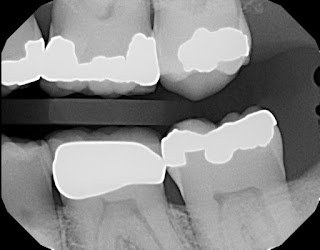Sometimes bitewings or regular periapicals are not enough?
My office doesn't have a panorex machine. For most situations a full set of periapical radiographs and bitewing x-rays are fine, but sometimes my patients have trouble tolerating the sensor far back in their mouths. Also my staff, who take my radiographs don't like hurting my patients by pushing the sensor way back. Most of time it's fine but it today I needed t be the meany by and take an xray practically in my patients throat.
My patients is a very sweet 83 years old and has been in my care since 1984. She seldom has problems and doesn't like x-rays. We take them, but not every year. Usually we are taking Bitewings every year and a half to two years.
Today she was in my schedule with the note that she had a problem with swollen gums. After she was seated I asked what was bothering her and she laughed and said it was bothering me in the back on the left for two weeks but today she felt better.
I checked in the area and her #19 and #18 looked fine, but when I probed the distal of #18 she had a new 10+mm pocket. I took matters into my own hands and placed my dexis sensor practically in her throat so that it would capture the area well posterior to #18 and to my surprise the radiograph showed an impacted wisdom tooth with a radioluscency around it and it looked like the wisdom tooth had caries.
I probed the area further and I was able to visualize some suppuration coming from the sulcus distal to #18. I immediately placed a call to my Oral Surgeon and asked if he could see my patient. He saw her and prescribed some antibiotic for now and he plans on removing part of the tooth ( a coronectomy) after the New Year, since my patient is planning on visiting her out of town daughter over the holidays. When he performs this procedure after the holiday and he will send the tissue removed to be examined by a oral pathologist . Some cysts (odontogenic keratocyst for example) can be aggressive and if possible the cyst should be removed in its entirety and examined by a pathologist afterwards to obtain an accurate diagnosis.
from Ask Dr. Spindel - http://lspindelnycdds.blogspot.com/2019/12/sometimes-bitewings-or-regular.html - http://lspindelnycdds.blogspot.com/




Comments
Post a Comment